The most common obstacle that many electric vehicle owners face while looking for the best EV home charger UK, is having too many options but not knowing which item best meets their needs. There’s a wide variety of EV charging equipment available online and many of these units are cheap and unsafe for use.
You can easily spend your hard-earned money on a product which you thought was the right choice, only to feel disappointed once you realize that it doesn’t provide the quality and efficiency you are looking for in your car.
In this article, we answered 7 essential questions to help you choose the best EV charger for your car so you can get your money’s worth and avoid disappointment. We also shared some bonus tips in the later sections, so keep reading till the end.
- What Connector Type Does Your Vehicle Use?
Different varieties of electric vehicles use different connector types: Type 1, Type 2 and Type 3. Figure out which type your vehicle uses before you start looking for an EV charger.
Type 1
Type 1 connectors are single-phase (power flows through a single conductor) and provide fast charging at 3.7kW-7.4kW AC power output levels and a range of approximately 12.5-25 miles per hour. This type features a 5-pin design and is generally used on car models from Asia and less in Europe.
Don’t buy this type of connector in the UK since it’s highly unlikely that you will find a charging port that supports it and you will be wasting your money.
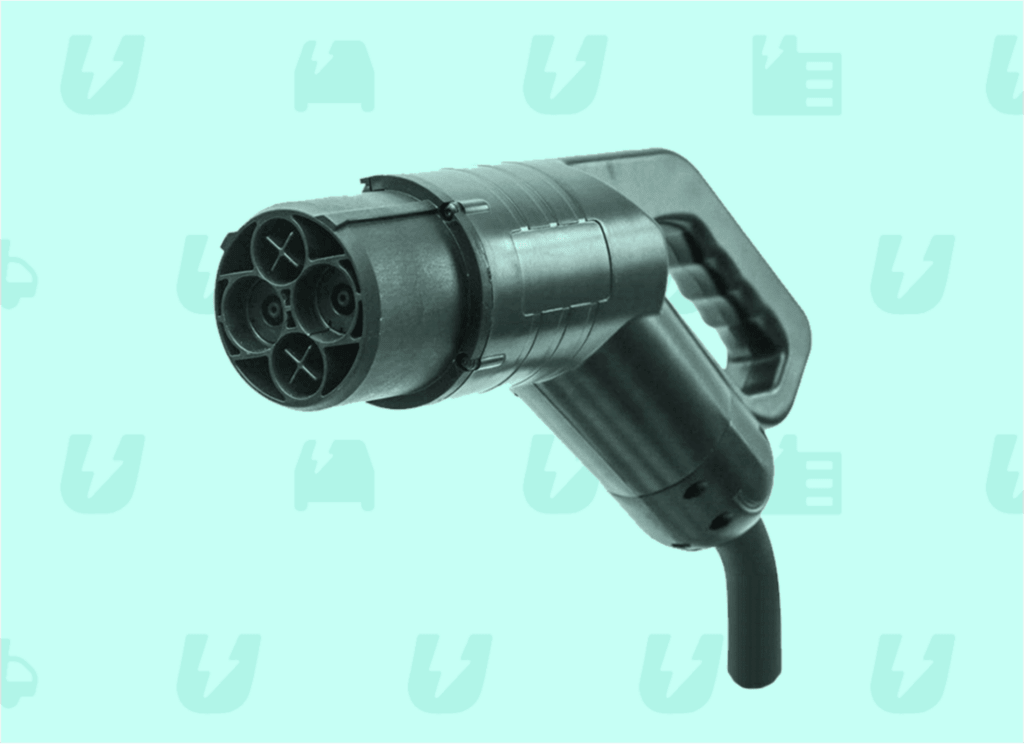
Type 2
Type 2 connectors are 7-pin plugs that are the standard for European markets. These units provide fast charging at power outlet levels of 3.7kW-7kW AC and offer an approximate range of 12.5-25 miles per hour of charging.

The only exception to this standard is the Tesla Superchargers which transmit DC on Type 2 plugs with an output level of up to 130kW and a range of 180 miles per hour.
The majority of public charging stations use the Type 2 connector so it’s a feasible option for your car connector.
- Do You Need A Hardwire or Plug-in Charger?
EV chargers are either hard-wired or plug-in varieties and the right unit will depend on which version fits your charging needs.
Plug-in
Plug-in EV charging is just like charging your other electrical units – one end of the cable connects to the charging port or power source, while the other end connects to your car.
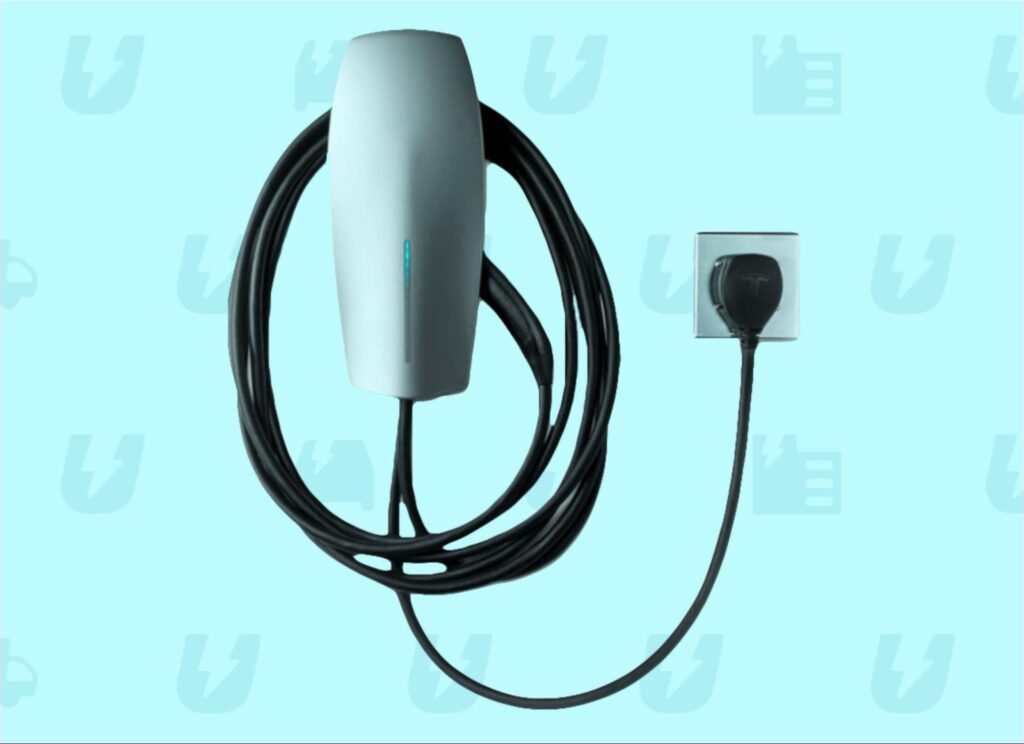
Pros of Using Plug-in EV Chargers
- Uses a common 240V plug and can be set easily on the wall of your house or your garage for easy charging.
- More portable and convenient for charging during occasional relocations or if you’re planning to move into different places in the future.
- A 240V outlet can be installed in designated spots like a communal parking area along with your apartment unit, so you can charge your vehicle just by plugging it in.
- The simple design makes it easy to install and plug the unit into your charging station.
- Can be used outside, although a waterproof cover is required for safe charging.
Cons of Using Plug-in EV Chargers
- The unit can wear down over time, after constant plugging and unplugging.
- Takes longer to fully charge with a charging capacity of 3.3kW per hour due to the limitations of the 13-amp fuse over the plug-in unit.
- Someone can tamper with your charger because it is portable and easily unplugged.
Hardwire EV Home Chargers
Hardwire chargers connect directly to the wall or power supply for a permanent charging setup at home. These chargers can provide up to 40-amps of power to your car.
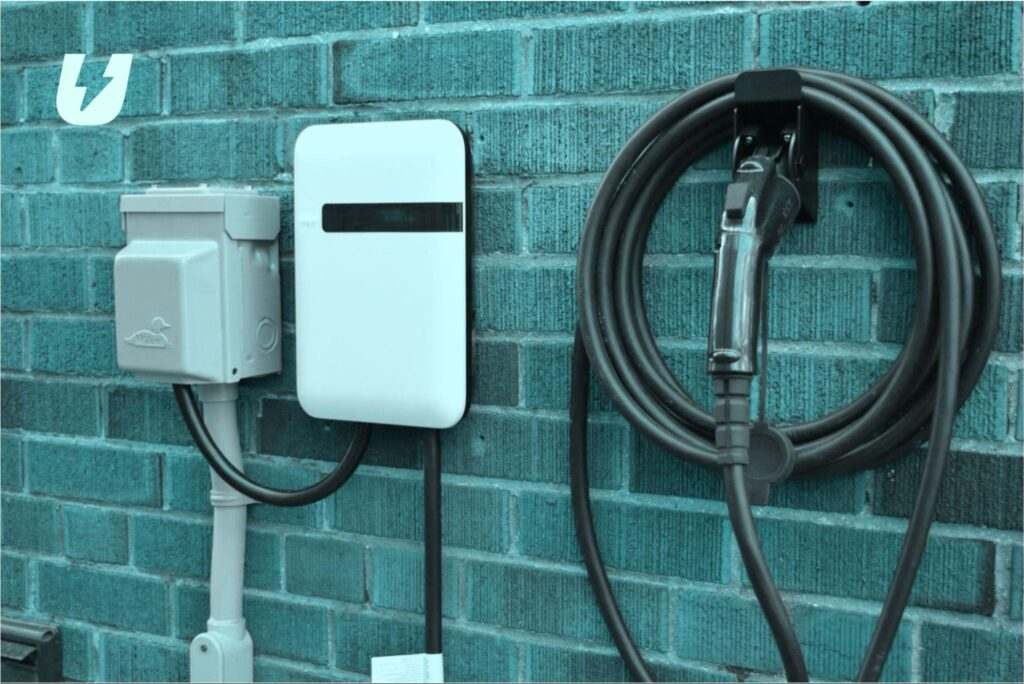
Pros of Using Hardwire EV Chargers
- Hardwired stations are sturdier than plug-ins, so you can use them for a very long time.
- These cables are design-friendly and easy to use in case you need to charge your vehicle but don’t have a cable on hand.
- Permanently affixed to your charging station so you can be confident that your vehicle will fully charge overnight.
- These cables generally cost less, so you can save more money.
- More convenient for outside installation and use because of their weather-resistant cover.
Cons of Using Hardwire EV Chargers
- Hardwire stations provide less mobility. You will require an electrician to uninstall and reinstall the unit before you can move it into a new location.
If you are renting a property and tend to occasionally transfer to another location, then a plug-in unit would suffice. These units are easy to remove and install so don’t have to hire an installer every time you move to another location.
If you have no plans of moving into another location any time soon, a hardwired unit is the best option because of its sturdiness and fast charging capacity – you can use these units for a very long time.
- What is the right Cable Length?
EV charging cable lengths can range from 12 feet (4m) to 25 feet (10m). It is always advisable to choose one that is long enough to reach your car’s charging port from its usual parking position.
But while a longer cable can provide more flexibility, it can also be more expensive and cumbersome. Unless the extra length is necessary, you only need just enough length for easy charging. A cable that’s at least 20 feet long should provide enough flexibility for your charging needs.
- Smart or Dumb EV Charger?
Because EV chargers are constantly evolving, Smart Chargers are built with many features designed to optimize your charging experience. But there are still many electric vehicle owners who prefer Dumb EV chargers because of their simplicity and ease of use.
Smart EV Charger
Smart EV chargers have apps that enable the user to perform essential tasks like monitoring real-time charging, reviewing charging history, scheduling charging sessions, starting or stopping charging sessions, setting reminders, and more.
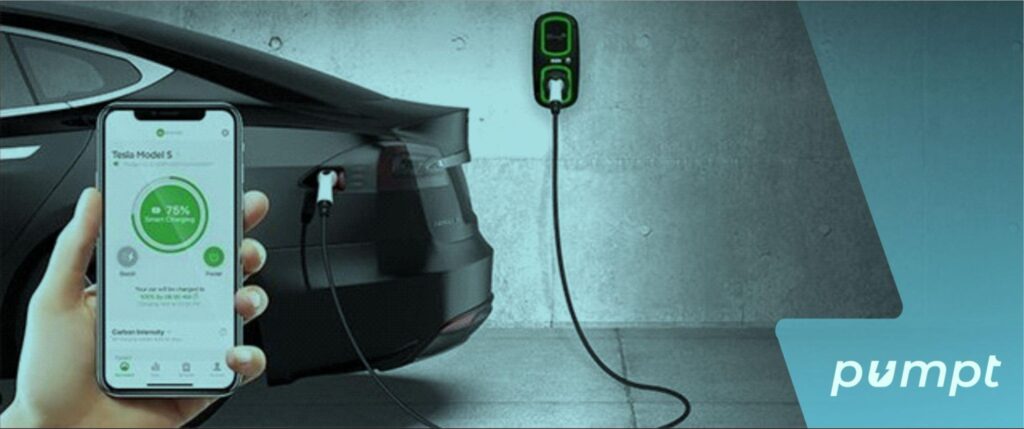
Pros of Using a Smart EV Charger
- The Monitor Charging feature can be set to automatically stop the charging session once charging is complete and done.
- Load balancing allows you to monitor your car’s power consumption, increase the charge rate while consumption is low, and decrease it when consumption is very high.
- Optimizes the charging process through features such as scheduled charging which presets charging time and uses lower-cost electricity.
- Speeds up charging with the combined power of the grid and solar energy.
Cons of Using a Dumb EV Charger
- A CT or energy meter is required for solar charging modes and load balancing which incur additional costs
- Some brands can be quite expensive.
Dumb 7kW EV Charger
Dumb EV chargers are just enhanced power outlets with either a Type 1 or Type 2 connector. These chargers are generally unrestrained and serve as a plain power socket which plugs into your car for direct charging.
These chargers do nothing else but charge your vehicle and many owners prefer this kind of simplicity. But just like 3-Pin sockets, your electric vehicle will still gather basic data such as kWh added and charge time.
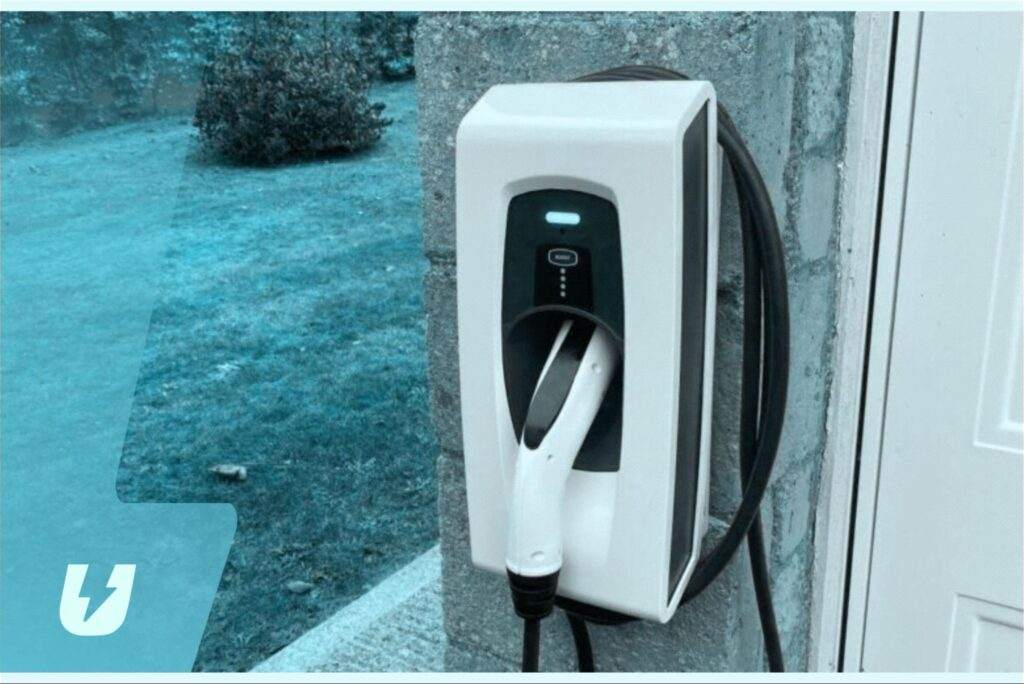
Pros of Using Dumb EV Chargers
- Has fast charging speeds of up to 7.4kW with single-phase and a range of 30 miles per hour.
- Easy and direct charging – all you need to do is plug and charge which is all that many EV owners need.
- Serves as an excellent supporting charger for EVs. If you want to fast charge more than one electric vehicle, then a dumb charger is a simpler and easier installation than another smart unit.
- More affordable. Dumb chargers cost approximately £299 online, while the installation cost is around £150.00, making a total of £450.00. The smart charger’s starting cost is around £650 which doesn’t include the installation service.
Cons of Using Dumb EV Chargers
- These units know only one task which is to charge and don’t know how to stop even if the battery is already full.
- They don’t gather data on energy usage, which is not good if your car is running on electricity.
Whether a dumb or smart charger works best for you depends on your preference as an EV owner. If charging capacity is all you’re looking for, and the extra costs of having a smart charging cable are unnecessary, then a dumb charger will suffice. However, that doesn’t change the fact that smart chargers outperform dumb units.
Smart chargers can provide you with total control of your charging needs, including kWh price caps, scheduled charging, solar integrations, etc. These chargers are also more efficient, although more expensive.
- How Much Does the EV Charger Cost?
Prices for EV charges vary according to type and brand but they generally average between £150 – £800. For a high-end product, you may have to spend £300 – £900 depending on the brand and type. These high-quality varieties are safety-certified for an electric vehicle charging station so they are safe to use.
You also need to consider your budget. To some, the cheapest EV home charger that offers a good warranty is a good choice. Others are willing to pay the extra cost as long as they can benefit from the additional features like reviewing the charging history, calculating charging costs, and other smart options.
But spending more doesn’t necessarily mean you will benefit more as there are charging stations and stores that provide discounts and special offers. So take the time to shop around before making a buying decision.
The most cost-effective unit would be the one that fits your budget and delivers quality performance. You will find such an item on our product page so don’t forget to check it out.
- Where Do You Want to Charge Your Car?
Are you planning to charge from a home EV charging point, domestic socket, or public charging point?
If you want to charge from a domestic socket, then you’ll need a portable charger. Check out our portable EV chargers for reference.
If you want to charge from a home EV charging point or public charging point, then you’ll need either a Type 1, Type 2 or Type 3 connector.
- What Phases or Current Does Your Vehicle Support?
There are two additional factors outside of the connector type and these include current and phases.
Current
Public charging stations generally have standard power output levels of 3.6kW and 7.4kW, which correlates to the 16-amp and 32-amp supply. But it’s still important to determine what current your electric car home supports because an EV with an onboard charger capacity of 3.6kW can only accept currents of 16 amps.
Even if you plug a 32-amp charging connector into a 7.4kW charging point, it won’t increase the charging rate, nor will it speed up charging.
Select an EV charger that can deliver at least 7,7 kW (32 amps) and 9.6 kW (40 amps) into your vehicle. Even if the EV you have now cannot support that much power, your next EV probably will and you can have a one-time investment for your charger today.
Phases
Phases entail the number of power lines inside the cable. More phases imply faster charging if the charge port and your car support it. More phases also mean thicker and heavier units to carry around.

Click here for more information on how to determine the phases that your car supports.
Bonus EV Home Charging Tips
Choosing the best home EV charger that satisfies your needs will depend on various factors we’ve discussed. Armed with this knowledge, you should be able to find the home charging unit you are searching for.
Choose the EV charger that is safety-certified by well-established bodies like the IEC and has a warranty period of at least 3 years. Buying a high-quality product from a reliable supplier will help ensure that you get a safe and reliable unit.
Irrespective of which EV home charger you decide to buy, you will require the services of a licensed electrician to determine your electric panel’s capacity. If you have an old house, you may need to improve your electrical service since older houses within the UK weren’t originally designed to support EV home charging.
Expand your understanding and explore further. Click here to learn more: How Much Is The Installation of An EV Charger At Home?

